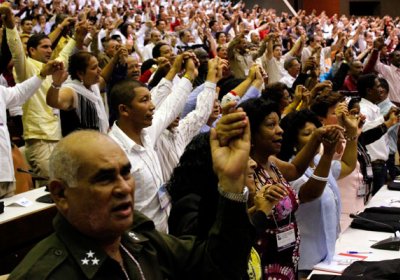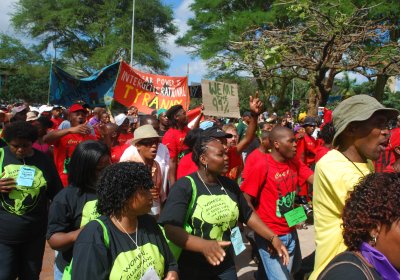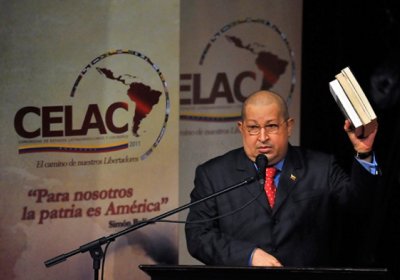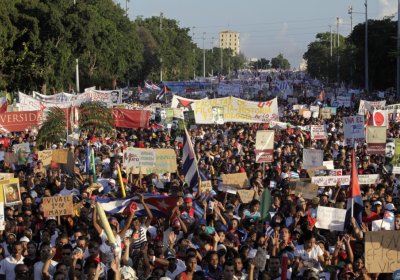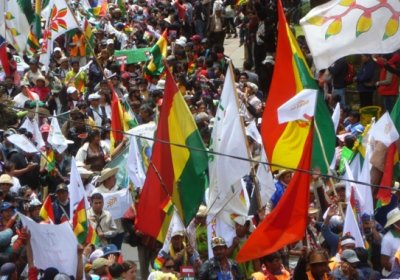Member countries of Latin America’s alternative integration bloc, the Bolivarian Alliance for the Peoples of Our America (ALBA), met for its 11th summit in Caracas on February 4 and 5 to discuss advancing the organisation.
ALBA is made up of the governments of Venezuela, Cuba, Bolivia, Ecuador, Nicaragua, Dominica, Saint Vincent and the Grenadines, and Antigua and Barbuda. Formed in 2004, ALBA seeks to develop trade on the basis of solidarity and cooperation.
Latin America & the Caribbean
From January 24-29, the Brazilian city of Porto Alegre was again the staging ground for the World Social Forum (WSF), an annual international gathering of anti-globalisation and anti-capitalist activists. Among the various movements present, one of the most visible was Brazil's Movement of Landless Rural Workers (MST), possibly the largest social movement in Latin America.
The Sixth Congress of the Cuban Communist Party (PCC), held in April, “endorsed for the first time a fundamental change in the political and economic model”, said Cuban political scientist and Temas editor Rafael Hernandez.
This does not mean abandoning Cuba’s socialist project, but renewing this project after two decades of the post-Soviet “Special Period”. This is a deep structural crisis in Cuba’s post-capitalist, centrally-planned economy and an ideological and ethical crisis of the nation’s socialist vocation.
Venezuelan President Hugo Chavez has criticised the US State Department’s “absurd” decision to threaten Latin American countries with sanctions should they engage in trade with Iran.
Chavez made the comments on the state VTV channel after State Department spokesperson Victoria Nuland warned Latin American countries they would be liable to US sanctions if they were to use Iranian banks or purchase Iranian oil.
Venezuelan President Hugo Chavez condemned the United States’ decision to expel the Venezuelan consul general in Miami as “arbitrary and unjustified” on January 9. Chavez derided the move as “another demonstration of the arrogance of ridiculous imperialism”.
Venezuelan diplomat Livia Acosta Noguera had reportedly been working in the US since March when she was ordered to leave on January 8 amid claims that she had discussed the possibility of orchestrating cyber attacks against the US government whilst serving as vice-secretary at the Venezuelan embassy in Mexico.
The United Nations Climate Change Conference (COP17) was held in Durban from November 28 to December 11. The statement below was published on December 11 in response to the conference's outcomes by Climate Justice Now!, a network of organisations and movements from across the globe committed to the fight for social, ecological and gender justice.
Despite the crushing victory of incumbent Cristina Fernandez de Kirchner in the October 23 Argentine presidential elections, the campaign and results also demonstrated that an important social and political left alternative continues to exist.
The unpredictable consequences of the global economic crisis and the reaction by Cristina’s mixed social base to future policy decisions may prove important challenges to her new government.
A summit of huge importance was held in Venezuela on December 2-3. Two hundred years after Latin America’s independence fighters first raised the battle cry for a united Latin America, 33 heads of states from across the region came together to form the Community of Latin American and Caribbean States (CELAC).
For Latin America, the summit represented a further step away from its traditional role as the United States’ backyard and its emergence as a player in its own right in international politics.
Resources
The Sixth Congress of the Cuban Communist Party (PCC), held April 17-21, coincided with the 50th anniversary of Cuba’s historic defeat of the US-backed invasion at the Bay of Pigs and Fidel Castro’s proclamation of the socialist character of the Cuban Revolution.
When Fidel, 85, made a surprise appearance at the Congress closing session, many of the thousand delegates were overcome with emotion as aides helped him to his seat next to President Raul Castro.
Seven years after being launched by the Venezuelan and Cuban governments, the Bolivarian Alliance for the Peoples of Our Americas (ALBA) has become an important voice on the global stage willing to stand up and denounce capitalism.
ALBA has grown to include eight Latin American and Caribbean countries (Venezuela, Cuba, Bolivia, Ecuador, Nicaragua, Antigua and Barbuda, Dominica, Saint Vincent and the Grenadines.
Despite the government reaching an agreement with indigenous protesters on all 16 demands raised on their 10-week march onto the capital, La Paz, the underlying differences are far from resolved.
The recent march in Bolivia by some indigenous organisations against the government’s proposed highway through the Isiboro Secure National Park and Indigenous Territory (TIPNIS) has raised much debate among international solidarity activists.
- Previous page
- Page 114
- Next page

